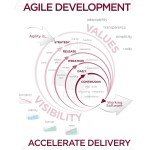Objectives & Accountability vs Responsibility & Autonomy, Part 2
I explained about objectives and the differences between MBOs and OKRs in Part 1. I’m tackling the issues of “accountability” in this part.
Examine Accountability
What does accountability mean to you?
I’m serious about that question. For many people—managers included—people are accountable when we can blame them for not doing something. If you don’t achieve one of your MBOs, your manager can blame you for your “failure.”
Too often, accountability is something some assigns you.
In OKRs, we are responsible for generating the objectives collaboratively. Based on the objectives, we create the key results collaboratively. One person can’t be accountable in the sense of blame if things go south.
How do we create “accountability” if we collaborate on everything? I wrote a piece about this in Resource Efficiency vs. Flow Efficiency, Part 4: Defining Accountability.
I’m not big on blaming people when things go wrong. I’d much rather help them do things right.
That’s why MBOs masked as OKRs don’t work.
Optimize for Flow with Responsibility
Instead of accountability let’s see if we can optimize for flow with responsibility and autonomy.
Instead of assigning accountability, how about taking responsibility?
What do we really want from people in an organization? We want results. We want people to take responsibility for creating results that work for our customers, products, and the organization as a whole.
Do we care how people achieve these results?
In too many organizations, we do. I’ve seen those controlling organizations:
- Divorce leadership from management
- Reduce people to fungible cogs
- Ignore the needs of the people for autonomy, mastery, and purpose
That’s not how we accomplish great work. Those controlling organizations have senior managers who believe they can “control” people’s actions with the relevant “rewards.”
Avoid the Illusion of Control
Managers who believe that have the illusion of control. And, because all motivation is intrinsic, the rewards mean much less than they believe.
Those are some of the beliefs behind resource efficiency management. Resource efficiency works for factories, especially for machine-based work. It doesn’t work as well for humans even in factories and doesn’t work for knowledge work. Flow efficiency works for knowledge work.
We have alternatives to resource efficiency. We can explain the goals we want(the objective) and the measures that support those results (the key results)? That’s the idea behind OKRs.
If your OKRs look like MBOs—personalized todo lists for you, without being linked to an organization-wide objective, ask for changes. You don’t have to talk about taking responsibility or your autonomy. Instead, try these questions:
- Tell me more about the organization-wide objective. I’m having trouble seeing the link to how the organization benefits.
- I want to take more responsibility for the objective as a whole. Can you explain more about why you need me to work in this way?
- Who else is working on this objective? How can I collaborate with that person or team?
These questions all aim to answer this question:
How do I optimize up, to benefit the entire organization?
Curiosity May Lead to Responsibility and Autonomy
Start with curiosity. It’s possible your manager or the person setting these objectives doesn’t know any other way to think or act.
Once you clarify the benefits to the organization, you can work in small pieces, delivering and demonstrating. You earned the trust of your manager. With more trust often comes more autonomy.
When you start with curiosity, you take responsibility and show your autonomy. You can treat your managers with dignity and respect. They can treat you with dignity and respect, too.
| Published on Java Code Geeks with permission by Johanna Rothman , partner at our JCG program. See the original article here: Objectives & Accountability vs Responsibility & Autonomy, Part 2 Opinions expressed by Java Code Geeks contributors are their own. |


